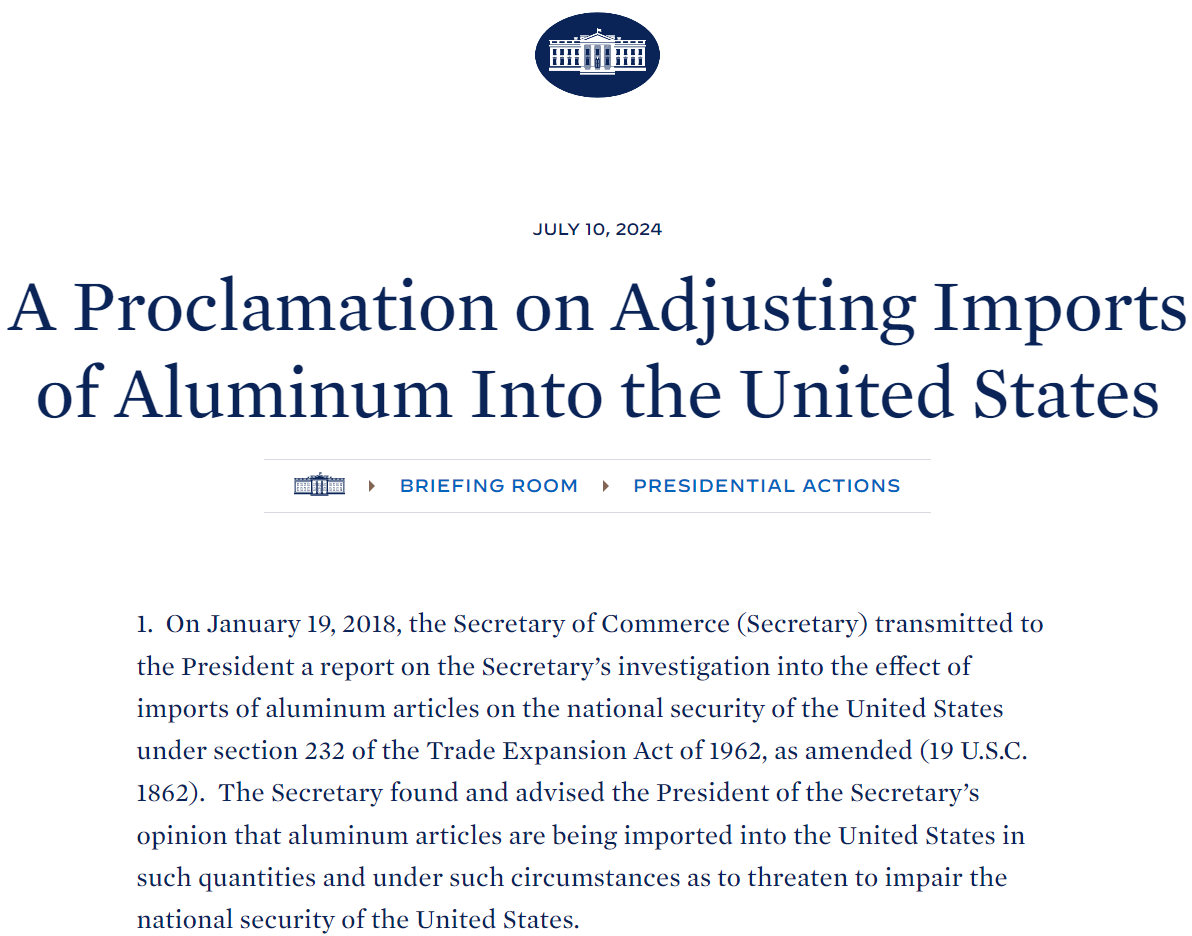The Presidential proclamation on aluminum imports and its impact on foundries
 On July 10, 2024, President Biden issued a proclamation to adjust imports of aluminum into the United States. This proclamation follows the findings from the Secretary of Commerce's 2018 report which highlighted that aluminum imports posed a threat to national security. Building on prior actions, such as Proclamation 9704 and subsequent adjustments, the current proclamation implements stringent measures for aluminum imports from Mexico. A key feature is the requirement for imports to be accompanied by certificates identifying the country of smelt and country of most recent cast, targeting aluminum sourced from China, Russia, Belarus, or Iran. Imports from Mexico containing aluminum from these countries will face increased tariffs unless they meet the new certification requirements.
On July 10, 2024, President Biden issued a proclamation to adjust imports of aluminum into the United States. This proclamation follows the findings from the Secretary of Commerce's 2018 report which highlighted that aluminum imports posed a threat to national security. Building on prior actions, such as Proclamation 9704 and subsequent adjustments, the current proclamation implements stringent measures for aluminum imports from Mexico. A key feature is the requirement for imports to be accompanied by certificates identifying the country of smelt and country of most recent cast, targeting aluminum sourced from China, Russia, Belarus, or Iran. Imports from Mexico containing aluminum from these countries will face increased tariffs unless they meet the new certification requirements.
Additionally, the proclamation maintains existing tariffs on aluminum imports from other countries while emphasizing the need for strict compliance with the new import requirements. The United States will monitor these measures to prevent transshipment and excess production that could undermine national security objectives. This ongoing surveillance ensures that the adjustments remain aligned with the overarching goal of protecting domestic aluminum production and national security.
A copy of the proclamation is available at https://www.whitehouse.gov/briefing-room/presidential-actions/2024/07/10/a-proclamation-on-adjusting-imports-of-aluminum-into-the-united-states-6/.
Impact on the Non-Ferrous Foundry Industry
 The introduction of new import requirements and increased tariffs on certain aluminum products from Mexico is expected to have a significant impact on the non-ferrous foundry industry. By enforcing stricter regulations on the origin of aluminum, the proclamation aims to limit the influx of lower-cost aluminum from countries like China and Russia. This could lead to a more stable and potentially higher price for domestically sourced aluminum, benefiting U.S. foundries by leveling the playing field and reducing unfair competition.
The introduction of new import requirements and increased tariffs on certain aluminum products from Mexico is expected to have a significant impact on the non-ferrous foundry industry. By enforcing stricter regulations on the origin of aluminum, the proclamation aims to limit the influx of lower-cost aluminum from countries like China and Russia. This could lead to a more stable and potentially higher price for domestically sourced aluminum, benefiting U.S. foundries by leveling the playing field and reducing unfair competition.
However, the requirement for detailed certificates of analysis could introduce additional administrative burdens and potential delays for importers, particularly those relying on aluminum from Mexico. Foundries may need to invest in compliance infrastructure or face disruptions in their supply chains. In the long term, this policy is likely to encourage increased domestic production and utilization of aluminum, supporting the industry's growth and sustainability by fostering a more robust and secure supply chain. However, the immediate effects could include increased costs and operational adjustments for non-ferrous foundries adapting to these new regulations.
